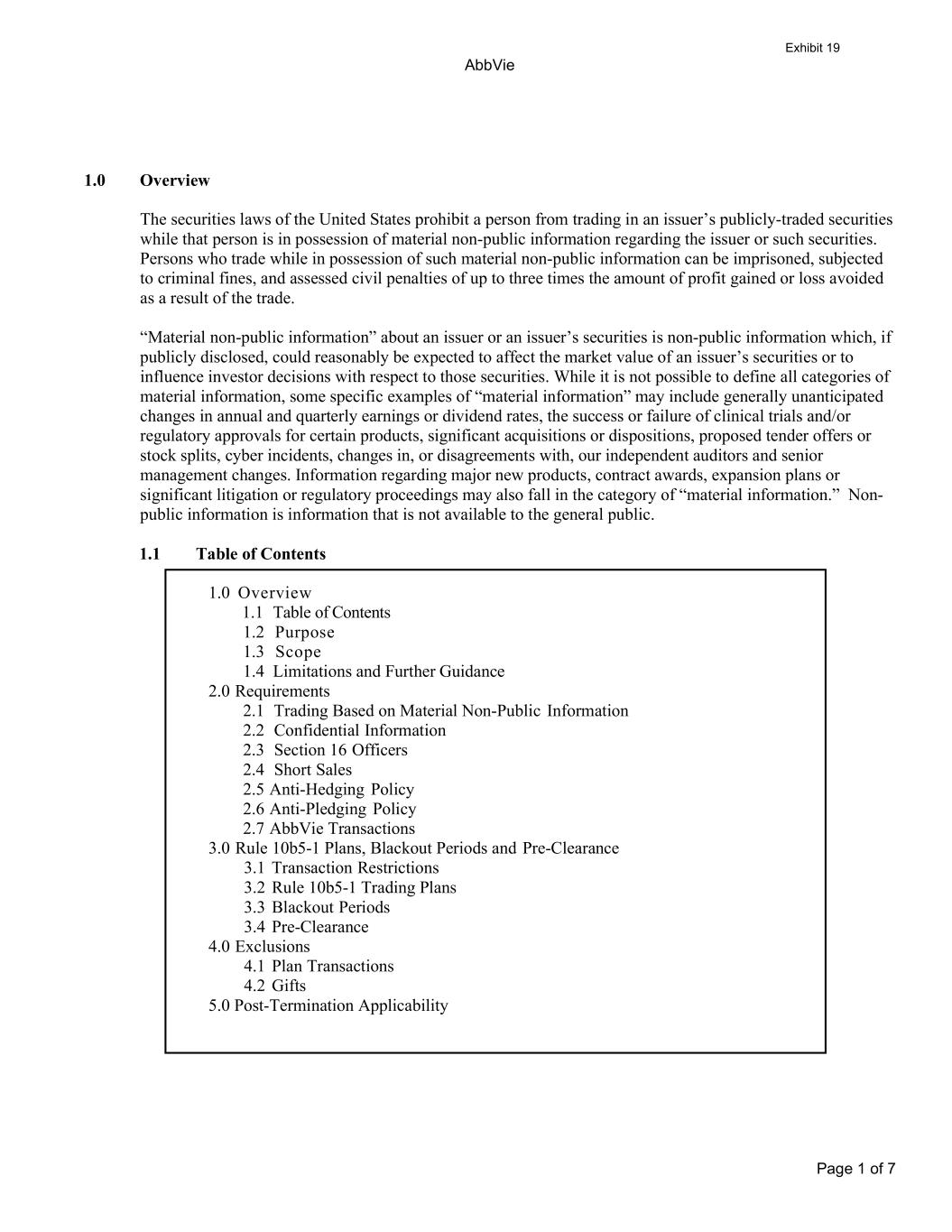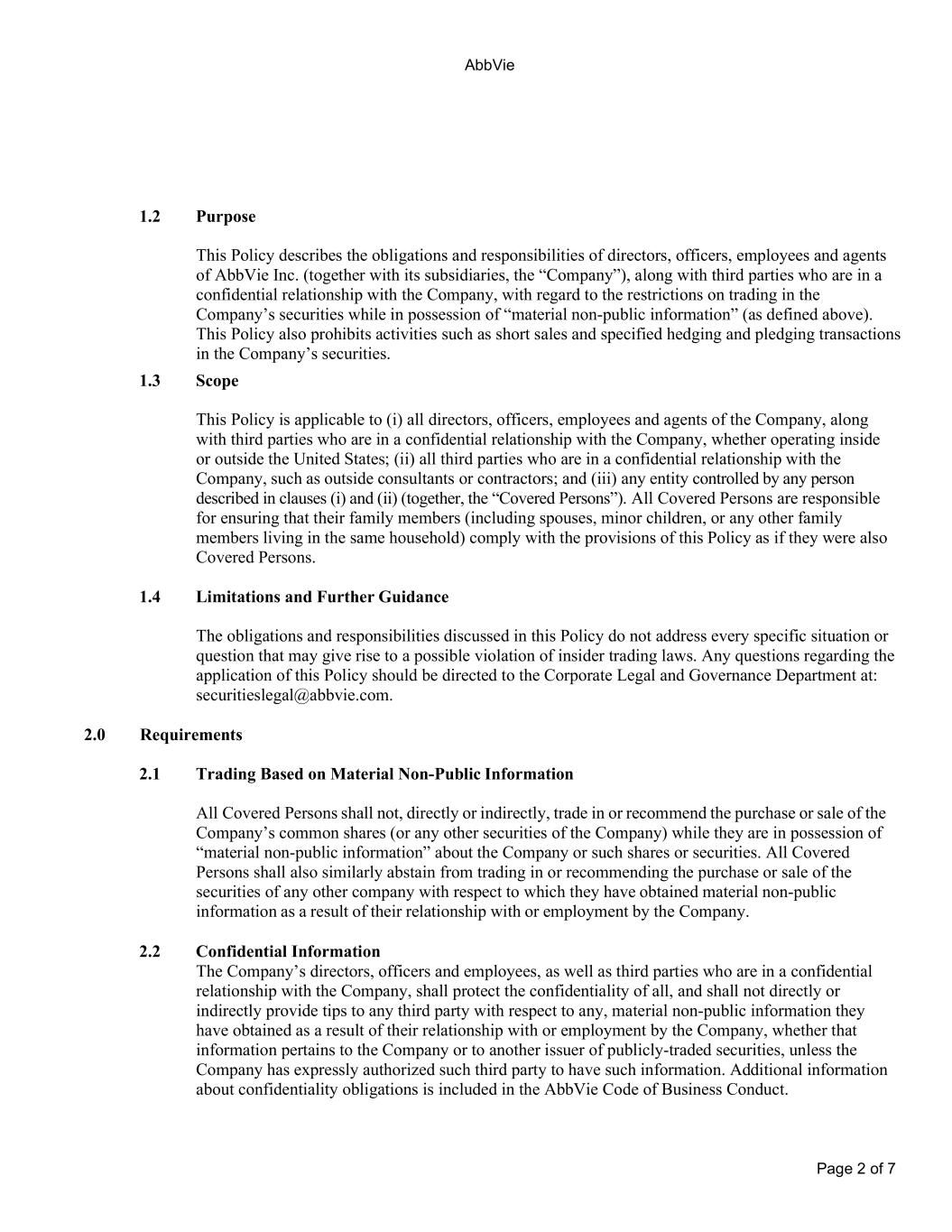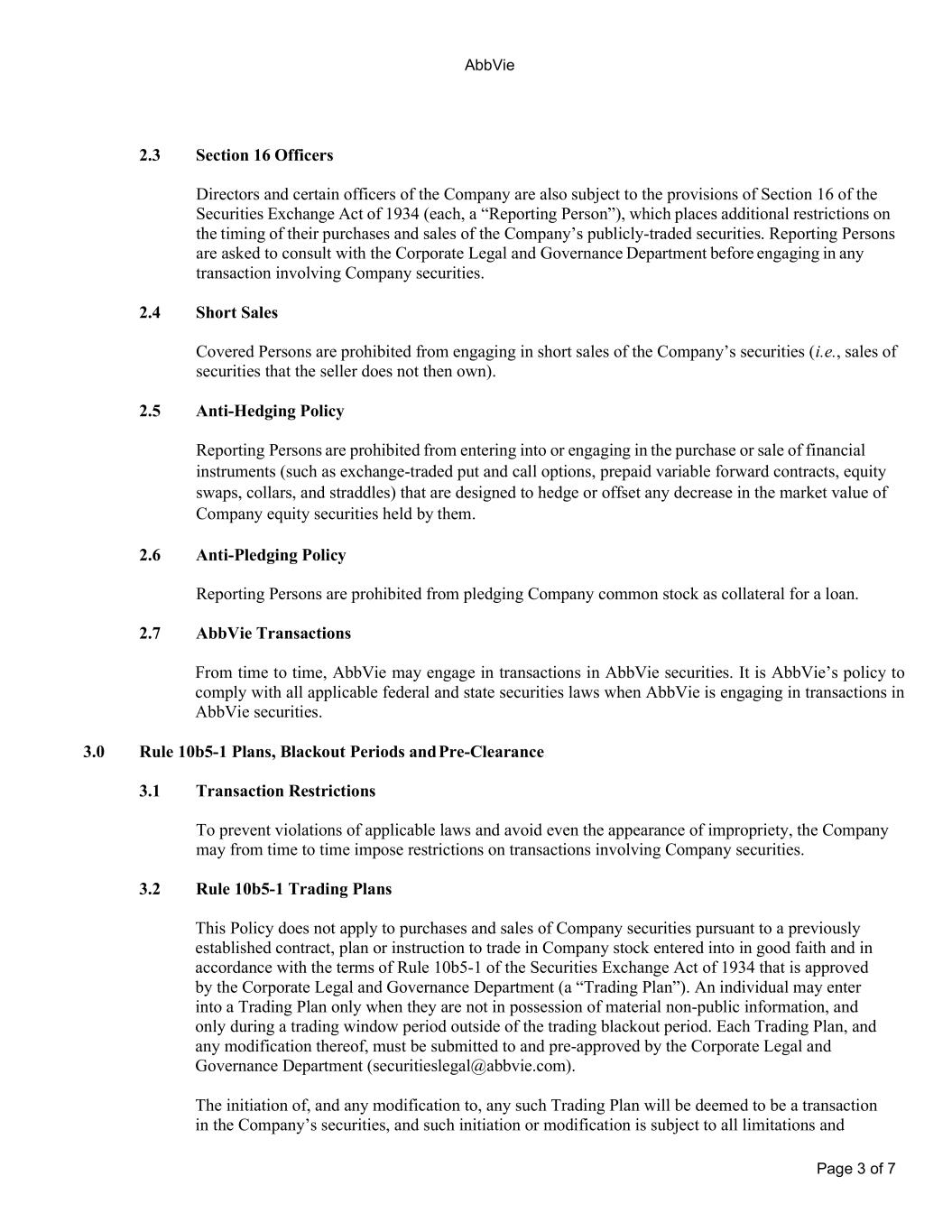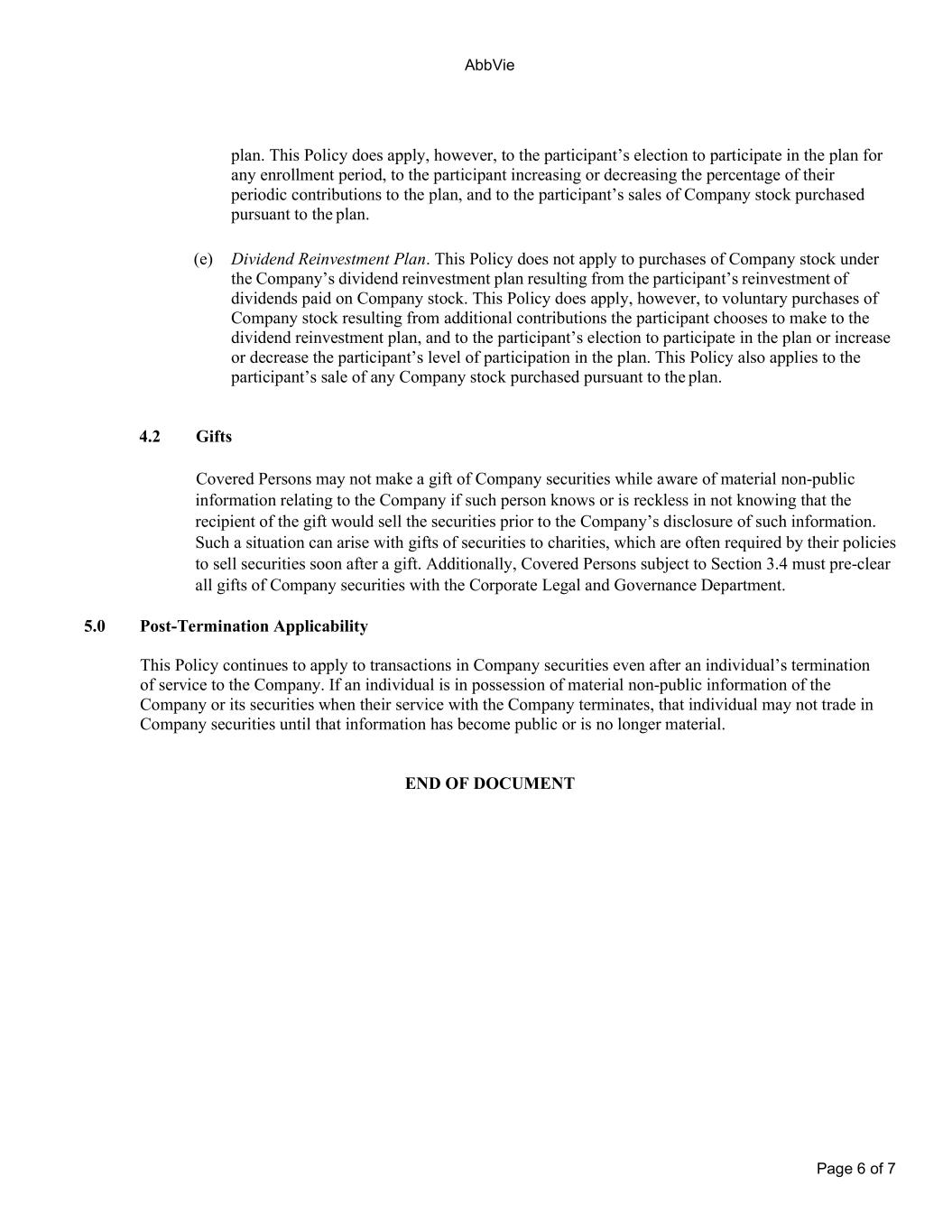
AbbVie Page 1 of 7 1.0 Overview The securities laws of the United States prohibit a person from trading in an issuer’s publicly-traded securities while that person is in possession of material non-public information regarding the issuer or such securities. Persons who trade while in possession of such material non-public information can be imprisoned, subjected to criminal fines, and assessed civil penalties of up to three times the amount of profit gained or loss avoided as a result of the trade. “Material non-public information” about an issuer or an issuer’s securities is non-public information which, if publicly disclosed, could reasonably be expected to affect the market value of an issuer’s securities or to influence investor decisions with respect to those securities. While it is not possible to define all categories of material information, some specific examples of “material information” may include generally unanticipated changes in annual and quarterly earnings or dividend rates, the success or failure of clinical trials and/or regulatory approvals for certain products, significant acquisitions or dispositions, proposed tender offers or stock splits, cyber incidents, changes in, or disagreements with, our independent auditors and senior management changes. Information regarding major new products, contract awards, expansion plans or significant litigation or regulatory proceedings may also fall in the category of “material information.” Non- public information is information that is not available to the general public. 1.1 Table of Contents 1.0 Overview 1.1 Table of Contents 1.2 Purpose 1.3 Scope 1.4 Limitations and Further Guidance 2.0 Requirements 2.1 Trading Based on Material Non-Public Information 2.2 Confidential Information 2.3 Section 16 Officers 2.4 Short Sales 2.5 Anti-Hedging Policy 2.6 Anti-Pledging Policy 2.7 AbbVie Transactions 3.0 Rule 10b5-1 Plans, Blackout Periods and Pre-Clearance 3.1 Transaction Restrictions 3.2 Rule 10b5-1 Trading Plans 3.3 Blackout Periods 3.4 Pre-Clearance 4.0 Exclusions 4.1 Plan Transactions 4.2 Gifts 5.0 Post-Termination Applicability Exhibit 19

AbbVie Page 2 of 7 1.2 Purpose This Policy describes the obligations and responsibilities of directors, officers, employees and agents of AbbVie Inc. (together with its subsidiaries, the “Company”), along with third parties who are in a confidential relationship with the Company, with regard to the restrictions on trading in the Company’s securities while in possession of “material non-public information” (as defined above). This Policy also prohibits activities such as short sales and specified hedging and pledging transactions in the Company’s securities. 1.3 Scope This Policy is applicable to (i) all directors, officers, employees and agents of the Company, along with third parties who are in a confidential relationship with the Company, whether operating inside or outside the United States; (ii) all third parties who are in a confidential relationship with the Company, such as outside consultants or contractors; and (iii) any entity controlled by any person described in clauses (i) and (ii) (together, the “Covered Persons”). All Covered Persons are responsible for ensuring that their family members (including spouses, minor children, or any other family members living in the same household) comply with the provisions of this Policy as if they were also Covered Persons. 1.4 Limitations and Further Guidance The obligations and responsibilities discussed in this Policy do not address every specific situation or question that may give rise to a possible violation of insider trading laws. Any questions regarding the application of this Policy should be directed to the Corporate Legal and Governance Department at: securitieslegal@abbvie.com. 2.0 Requirements 2.1 Trading Based on Material Non-Public Information All Covered Persons shall not, directly or indirectly, trade in or recommend the purchase or sale of the Company’s common shares (or any other securities of the Company) while they are in possession of “material non-public information” about the Company or such shares or securities. All Covered Persons shall also similarly abstain from trading in or recommending the purchase or sale of the securities of any other company with respect to which they have obtained material non-public information as a result of their relationship with or employment by the Company. 2.2 Confidential Information The Company’s directors, officers and employees, as well as third parties who are in a confidential relationship with the Company, shall protect the confidentiality of all, and shall not directly or indirectly provide tips to any third party with respect to any, material non-public information they have obtained as a result of their relationship with or employment by the Company, whether that information pertains to the Company or to another issuer of publicly-traded securities, unless the Company has expressly authorized such third party to have such information. Additional information about confidentiality obligations is included in the AbbVie Code of Business Conduct.

AbbVie Page 3 of 7 2.3 Section 16 Officers Directors and certain officers of the Company are also subject to the provisions of Section 16 of the Securities Exchange Act of 1934 (each, a “Reporting Person”), which places additional restrictions on the timing of their purchases and sales of the Company’s publicly-traded securities. Reporting Persons are asked to consult with the Corporate Legal and Governance Department before engaging in any transaction involving Company securities. 2.4 Short Sales Covered Persons are prohibited from engaging in short sales of the Company’s securities (i.e., sales of securities that the seller does not then own). 2.5 Anti-Hedging Policy Reporting Persons are prohibited from entering into or engaging in the purchase or sale of financial instruments (such as exchange-traded put and call options, prepaid variable forward contracts, equity swaps, collars, and straddles) that are designed to hedge or offset any decrease in the market value of Company equity securities held by them. 2.6 Anti-Pledging Policy Reporting Persons are prohibited from pledging Company common stock as collateral for a loan. 2.7 AbbVie Transactions From time to time, AbbVie may engage in transactions in AbbVie securities. It is AbbVie’s policy to comply with all applicable federal and state securities laws when AbbVie is engaging in transactions in AbbVie securities. 3.0 Rule 10b5-1 Plans, Blackout Periods and Pre-Clearance 3.1 Transaction Restrictions To prevent violations of applicable laws and avoid even the appearance of impropriety, the Company may from time to time impose restrictions on transactions involving Company securities. 3.2 Rule 10b5-1 Trading Plans This Policy does not apply to purchases and sales of Company securities pursuant to a previously established contract, plan or instruction to trade in Company stock entered into in good faith and in accordance with the terms of Rule 10b5-1 of the Securities Exchange Act of 1934 that is approved by the Corporate Legal and Governance Department (a “Trading Plan”). An individual may enter into a Trading Plan only when they are not in possession of material non-public information, and only during a trading window period outside of the trading blackout period. Each Trading Plan, and any modification thereof, must be submitted to and pre-approved by the Corporate Legal and Governance Department (securitieslegal@abbvie.com). The initiation of, and any modification to, any such Trading Plan will be deemed to be a transaction in the Company’s securities, and such initiation or modification is subject to all limitations and

AbbVie Page 4 of 7 prohibitions relating to transactions in the Company’s securities. The Company reserves the right from time to time to suspend, discontinue or otherwise prohibit any transaction in the Company’s securities, even pursuant to a previously approved Trading Plan, if the Company, in its discretion, determines that such suspension, discontinuation or other prohibition is in the best interests of the Company. The following restrictions apply to Reporting Persons (including their family members and controlled entities) in addition to the requirements for a Trading Plan set forth above: (a) Reporting Persons may only enter into or amend a Trading Plan during an open trading window, and not during a blackout period. (b) For Reporting Persons, the Trading Plan must also include a representation certifying that they are not aware of material non-public information about the Company and are adopting the plan in good faith and not as a scheme to evade the prohibitions of Rule 10b-5. (c) For Reporting Persons, the first trade may not occur under a Trading Plan until the later of (a) 90 days after the adoption of the plan, or (b) two business days following the disclosure of the Company’s financial results in a Form 10-Q or Form 10-K relating to the quarter in which the plan was adopted, subject to a maximum of 120 days after adoption of the plan. (d) Unless expressly approved by the Corporate Legal and Governance Department and compliant with Rule 10b5-1, a director or officer may have only one Trading Plan in effect at a time. (e) Any amendment to a Trading Plan will be treated as a termination of an existing Trading Plan and the entry into a new Trading Plan. Accordingly, the terms of any amendment must be approved in accordance with the terms of this Policy and shall otherwise comply with the terms of this Policy as if the amendment were a new Trading Plan. Any Reporting Person who desires to terminate a Trading Plan must consult with the Corporate Legal and Governance Department prior to terminating the Trading Plan. 3.3 Blackout Periods The Company imposes “blackout periods” to prevent trading on material non-public information. During these periods, directors, officers, and certain employees are prohibited from trading Company securities. These periods prevent trades when insider information might impact market perception. Blackout periods occur around quarterly earnings announcements and other major corporate events. Only trades pursuant to a Trading Plan or the excluded transactions in Section 4 below may execute during a blackout period.

AbbVie Page 5 of 7 3.4 Pre-Clearance Even when no blackout period is in effect, all directors and certain executives of the Company, as designated by the Company’s Executive Compensation group, must pre-clear all trades in Company securities (including gifts) with the Corporate Legal and Governance Department. 4 Exclusions 4.1 Plan Transactions (a) Stock Option Exercises. This Policy does not apply to the exercise of a stock option granted pursuant to the Company’s equity plan if (a) the person pays cash, or (b) the Company withholds shares subject to an option, in each case, to satisfy the exercise price and tax withholding requirements. This Policy does apply, however, to any sale of stock as part of a broker-assisted cashless exercise of an option, or any other market sale of stock for the purpose of generating the cash needed to pay the exercise price of an option, tax withholding or otherwise. The Policy also applies to any market sale of stock acquired upon the exercise of an option. (b) Restricted Stock Unit and Performance Awards. This Policy does not apply to the vesting of restricted stock units or performance awards, or tax withholding pursuant to which the Company withholds shares of stock to satisfy tax withholding requirements upon the vesting of any restricted stock units or performance awards. The Policy does apply, however, to any market sale of stock acquired upon the vesting of restricted stock units or performance awards. (c) 401(k) Plan. This Policy does not apply to purchases of Company stock in the Company 401(k) plan resulting from the participant’s periodic contributions to the plan pursuant to the participant’s payroll deduction election made when they were not aware of material non- public information. This Policy does apply, however, to certain elections the participant may make under the 401(k) plan, including: (i) an election to increase or decrease the percentage of the participant’s periodic contributions that will be allocated to Company stock; (ii) an election to make an intra-plan transfer of an existing account balance into or out of Company stock; (iii) an election to borrow money against the participant’s 401(k) plan account if the loan will result in a liquidation of some or all of the participant’s Company stock balance; and (iv) an election to pre-pay a plan loan if the pre-payment will result in allocation of loan proceeds to Company stock. This Policy does not apply to purchases of Company stock in the 401(k) plan resulting from the automatic reinvestment of dividends paid on Company stock. This Policy does apply, however, to a voluntary election to reinvest dividends or receive cash payouts of dividends. (d) Employee Stock Purchase Plan. This Policy does not apply to purchases of Company stock in the employee stock purchase plan resulting from the participant’s contribution to the plan pursuant to the election the participant made at the time of the participant’s enrollment in the

AbbVie Page 6 of 7 plan. This Policy does apply, however, to the participant’s election to participate in the plan for any enrollment period, to the participant increasing or decreasing the percentage of their periodic contributions to the plan, and to the participant’s sales of Company stock purchased pursuant to the plan. (e) Dividend Reinvestment Plan. This Policy does not apply to purchases of Company stock under the Company’s dividend reinvestment plan resulting from the participant’s reinvestment of dividends paid on Company stock. This Policy does apply, however, to voluntary purchases of Company stock resulting from additional contributions the participant chooses to make to the dividend reinvestment plan, and to the participant’s election to participate in the plan or increase or decrease the participant’s level of participation in the plan. This Policy also applies to the participant’s sale of any Company stock purchased pursuant to the plan. 4.2 Gifts Covered Persons may not make a gift of Company securities while aware of material non-public information relating to the Company if such person knows or is reckless in not knowing that the recipient of the gift would sell the securities prior to the Company’s disclosure of such information. Such a situation can arise with gifts of securities to charities, which are often required by their policies to sell securities soon after a gift. Additionally, Covered Persons subject to Section 3.4 must pre-clear all gifts of Company securities with the Corporate Legal and Governance Department. 5.0 Post-Termination Applicability This Policy continues to apply to transactions in Company securities even after an individual’s termination of service to the Company. If an individual is in possession of material non-public information of the Company or its securities when their service with the Company terminates, that individual may not trade in Company securities until that information has become public or is no longer material. END OF DOCUMENT





